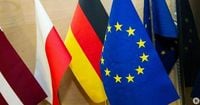On May 9, 2025, Slovak Prime Minister Robert Fico made headlines as he attended the celebrations marking the 80th anniversary of Victory Day in Moscow. His presence at the event sparked a significant backlash from the Slovak opposition, who labeled his visit a "disgrace" and a "betrayal" of national interests.
During the festivities, Fico spoke out against the notion of a new "iron curtain" in Europe, advocating for the development of normal and friendly relations with Russia. According to TASS, he emphasized, "I reject the idea that the European Union, Europe, should erect a new 'iron curtain.' Therefore, please perceive my presence in Moscow as a clear attempt to extend a hand over this 'iron curtain' for the development of normal, friendly, and economic cooperation with the Russian Federation." He further expressed his respect for the memory of those who fought for Slovakia's freedom during World War II, stating that his visit also served as a gesture of homage to the soldiers who liberated Slovakia in 1944-1945.
However, Fico's remarks and actions drew sharp criticism from various political factions within Slovakia. The opposition party SaS, led by Branislav Greling, condemned the visit, stating, "This is a disgrace and a slap in the face to our foreign partners and allies in the European Union and NATO." Greling added that Slovakia's international partners are now forced to view the country as an unreliable partner under Fico's leadership. He argued, "History will remember who stood with the aggressor and who preserved their honor."
Pavel Macko, head of the ODS party, echoed these sentiments, expressing disappointment that Fico chose to celebrate in Moscow rather than at home. Macko stated, "Fico decided that he would not stay at home, would not celebrate peace here, would not try to take measures so that Slovakia would be a part of the world and stand on the right side of history, but would help propagandize the war machine of [Russian dictator Vladimir] Putin."
The backlash escalated as the opposition considered filing a criminal complaint against Fico for treason. Michal Šimečka, leader of the Progressive Slovakia party, described the visit as one of the worst moments in Slovakia's foreign policy, declaring, "This is a disgrace for Slovakia, it is a betrayal of our national interests."
In light of Fico's visit, Ukrainian President Volodymyr Zelenskyy had previously warned that Ukraine could not guarantee the safety of foreign representatives during visits to Moscow for the May 9 parade. "Our position is very simple regarding all countries that traveled or are traveling on May 9: we cannot be responsible for what happens on the territory of the Russian Federation. They provide you with security, and therefore we cannot provide you with any guarantees," Zelenskyy stated.
Additionally, the Ukrainian Ministry of Foreign Affairs urged foreign nations to refrain from allowing their military personnel to participate in the May 9 celebrations. The ministry asserted that such participation would be deemed unacceptable and would be seen as "disrespect for the memory of the victory over Nazism, the memory of millions of Ukrainian front-line soldiers who liberated the country and all of Europe from Nazism eight decades ago."
Fico's controversial visit has reignited debates over Slovakia's foreign policy direction and its relationship with Russia, particularly in the context of ongoing tensions in Eastern Europe. As the opposition continues to rally against the Prime Minister's actions, the implications of his visit may resonate beyond Slovakia's borders, affecting its standing within the EU and NATO.
While Fico's government has positioned itself as one seeking to foster dialogue with Russia, the opposition's vehement response underscores the deep divisions in Slovak politics regarding relations with Moscow. The situation remains fluid as both domestic and international observers closely monitor the fallout from Fico's visit.
As Slovakia navigates these turbulent political waters, the legacy of its historical ties to Russia and the ongoing conflict in Ukraine will undoubtedly shape the discourse surrounding its future diplomatic engagements. With calls for accountability from the opposition and a growing sense of national pride among Slovaks, the coming weeks will be crucial in determining the trajectory of Slovakia's foreign relations.




